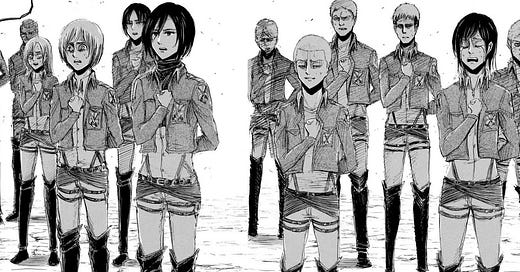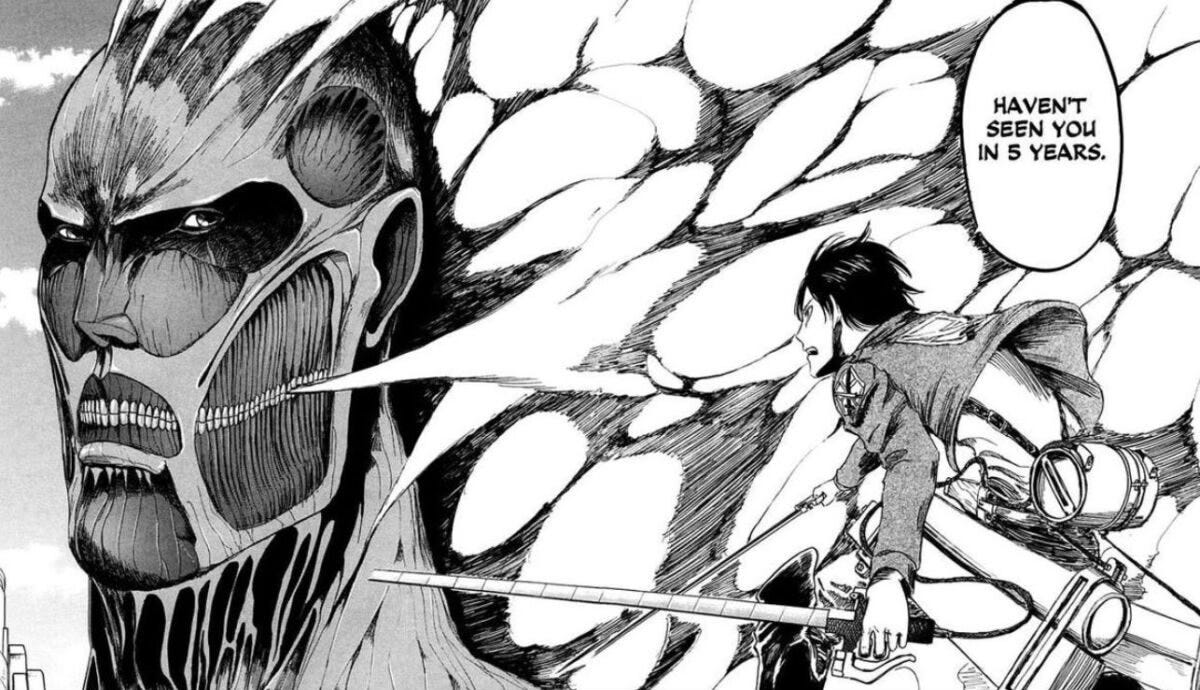Preface!
So I started binge-watching Attack on Titan. I stopped reading it a couple of years ago, I don’t remember why. I remember hating how the titans themselves looked, but I don’t think that was enough to stop me.
Anyway, point being, usually when I revisit a series, there is this wonderful rediscovery process where I remember all the great things I had forgotten. This happened recently with Chainsaw Man. I remembered highlights, but the pieces in between were so much fun to revisit and re-experience. Mainly Kobeni working at that burger joint. I had forgotten all about that!
That didn’t happen with Attack on Titan. With Attack on Titan, I remembered everything before it happened. All the pieces in between, not just the highlights. I remembered character names too, which is like… crazy. My memory is not that good.
And that’s the thing. My memory is not that good, right? But Attack on Titan is that good. So good that it made up for my bad memory.
Preface over. And major Attack on Titan spoilers ahead.
There’s a scene in The Office that I often think about, and it’s the scene where Andy Bernard is trying to push himself into a better life focused on his artistry. In order to do that, he has to eliminate his safety net, leaving nothing left to fall back on.
So he defecates on his boss’s car.
You may be asking why I often think of this scene, and to be fair, I often wonder that too, but I kind of get it. It’s a solid notion. So many of us—and by extension, so many of the characters we create—are capable of great things, but greatness is hard to pursue and harder still to find. Why not choose comfort and contentment when nothing is guaranteed if you leave that behind?
Storytelling is the same. And I’m extra excited to be writing about this topic today because it’s seemingly so simple, but not everyone does it, or actively thinks about it.
Stories aren’t about staying content in the way life has always been. Stories are about characters moving forward, either because they literally have to or because they need to. And that initial spark of forward movement is what makes a story. It’s your job—and my job—as a storyteller to make that spark become a fire. That fire being what I refer to from here on out as the propellant.
In Attack on Titan, right from the start, as readers, we are propelled forward.
That’s primarily because the characters are propelled forward. Sounds obvious, yeah? Stay with me. Mikasa was propelled forward from her childhood when her family was killed. Eren is propelled forward when his family is killed. Everyone is always being propelled forward by inescapable events that serve as the ignition for their propellant. Eren is a titan, Eren is condemned to die, there is nowhere for Eren to go. Humanity itself has to move forward or they will be killed by the titans.
Full stop.
There’s only one direction forward, and it’s not backward.
Plot, in general, needs propellant. Something that makes both your protagonist (and other characters) and your reader move forward. And for readers, they don’t just need a path forward, they need reason to take that path forward alongside the story, and reason to care about the characters walking that path forward.
That doesn’t mean you have to cut out all means of retreat like Attack on Titan does to Eren. Consider it an opportunity to express why your protagonist chooses to move forward instead of staying back. While propellant is a necessary force, it also has to make sense.
With any epic adventure, this may go without saying. Frodo has to take the ring, because if he doesn’t, Middle Earth will fall. But why Frodo? What is his propellant to take it and go? Because no one else would, and, similarly, because no one else can be trusted.
In Harry Potter, why does it have to be Harry to face Voldemort? Because it’s his destiny. Literally no one else can. It’s in the writing.
When you create these inevitable paths forward for your protagonist, it’s almost assured that the reader has to follow along. But not every story is an epic adventure with such an inevitable way forward.
A “quieter” example. There’s this wonderful book that I read years ago that’s stuck with me. It’s called The 100-Year-Old Man Who Climbed Out the Window and Disappeared, by Jonas Jonasson. In the story, Allan is about to turn 100, he’s in a nursing home, he’s lived a full life, but rather than hang around for his birthday party tomorrow, he—as the title suggests—climbs out of his window. And disappears.
What follows is a ridiculous adventure where this 100-year-old man essentially starts a new life. At any point in this journey, he could have turned back, gone back to the quiet life. End of story. So what is the propellant that moves him forward, and is it the same as the propellant that moves us, the reader, forward?
Essentially, yes. Allan wants more out of life. As readers, we want him to find that. The key, though, is in aligning readers with that base desire enough that we need to see it happen. That’s where the rest of the story elements come into play. If Allan is just an old guy, sure, maybe we’re curious to see where he goes for awhile, but in order to ensure readers don’t turn back midway through Allan’s journey, there needs to be something more, character development, humor, tension, something.
It has all of that, the same way Attack on Titan does. This is why I love looking at manga for craft elements. Because just like studying caricatures for bodily features, everything is magnified, everything is “extra.”
In Attack on Titan, Eren may be inevitably propelled forward for lack of anything to fall back on, but as readers, our propellant is also tied into caring about his fate, about Mikasa and Levi and humanity’s shared fate. Without that care, why would Eren’s propellant carry over to us? Sure, we want to see these larger-than-life stakes, but just because the world is on the brink of destruction doesn’t mean that everyone will connect with it. Connecting on a personal level is so much more propelling.
In 100-Year-Old Man, which I’ll be abbreviating for my own sake, Allan’s backstory endears us to him as we go forward with him. He’s an extraordinary man who didn’t want an ordinary end. He’s done some incredible things.
The same goes with Eren and Mikasa. As characters, what ties us to them is what pushes us forward. High stakes are added sauce, sure, but sauce alone doesn’t make a meal. At the end of the day, these are two great characters are forced forward, and that’s enough to keep an audience interested any day of the week.
Hey, creatives. Take any scene you’re working on. Literally any. Look at it for two things—what is propelling the characters involved forward, and why do you think the reader should care? Now, here’s something to try. Could you make that propellant even stronger? If they’re leaving home, can you burn their house down behind them? If they’re going on an adventure, what can you take away that pushes them forward?
And take time to express why that has such meaning to the character. This is the “make the reader care” part.
Hey, fans of Attack on Titan (so… everyone?). There are so many half human, half monster stories out there. Why is Attack on Titan the best one?








Great post! I personally think it's important to strike a balance. 'Propellant' as you put it, is often necessary for a character to move forward, but it can also feel like a character has no agency. I think that sometimes a character should have multiple paths in front of them, and the path they choose demonstrates their true internal character.
Of course, Attack on Titan makes perfect use of propellant to drive its characters forward.